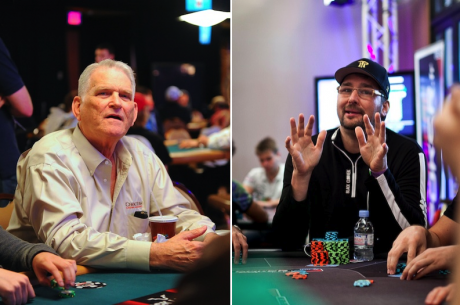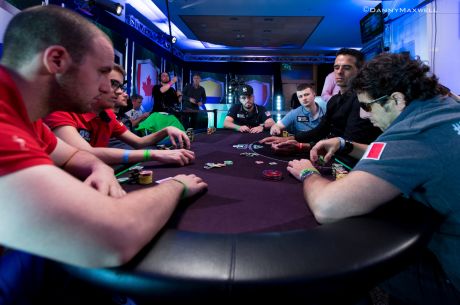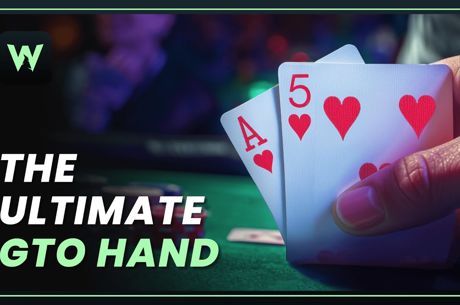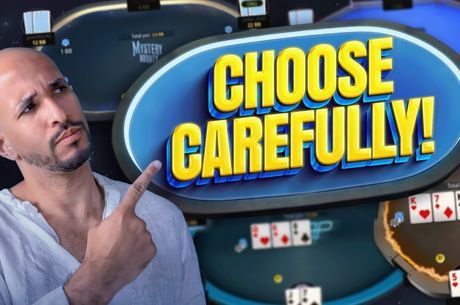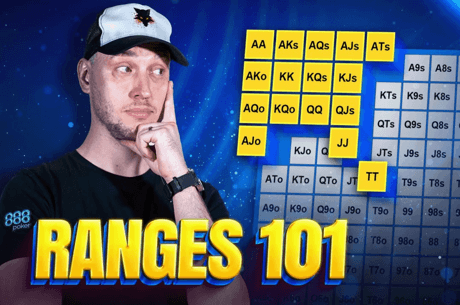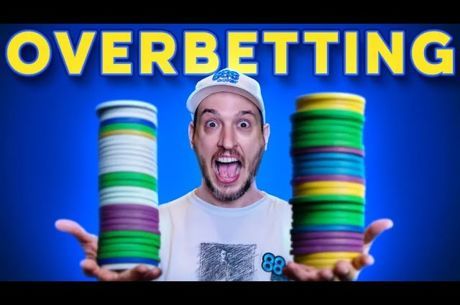Being Deceptive by Not Being Deceptive -- A Poker Paradox Explained

Bart Hanson — who spoke with PokerNews over the weekend about Omaha Hi-Low strategy — also writes excellent columns on poker strategy for Card Player magazine. In a recent one, he discussed the uncommon but happy situation of flopping the nut flush in no-limit hold’em.
His argument for playing it fast and aggressively can be summarized by these points:
- On one-suit boards, you’ll never get value from one-pair hands, so don’t worry about chasing them out. The goal is to get value from players with sets, lower flushes, and flush draws.
- Whenever you slow play, then turn aggressive on a later street, it screams “nuts,” and you’ll shut down players with lesser holdings. It’s less suspicious when you bet every street.
- Action-killing cards — a fourth suited card or a pair on the board — can come on the turn or river.
- The most deceptive way to play such a strong hand is, paradoxically, to bet it.
Though I think he’s right on all counts, it’s that last point that most made me want to stand up and cheer. It’s something that I discovered to be true about super-strong flopped hands long ago, at least as no-limit hold’em is played in the lower stakes that I usually inhabit — there you are often most deceptive by being straightforward.
Most players at the $1/$2 and even $2/$5 levels simply cannot resist the impulse to slow play their flopped monsters, by which I mean nut flushes and above. To be sure, there is some logic to this. If you have all of a flop, it’s hard for anybody else to have any of it, so you want to “give them a chance to catch up,” as the conventional wisdom has it.
The problem is twofold. First, this approach fails to maximize value, because you’re not building big pots for your big hands.
Second, this approach makes you too transparent. After raising preflop, you continuation bet the flops that give you, say, top pair or a strong draw, right? If you combine that with slow playing your biggest flops, you risk turning yourself into what I’ve heard called a “backward bettor” — that is, somebody who bets his bluffs and weak hands, but doesn’t bet his strong ones.
As with most good poker advice, this is a point that Mike Caro has been preaching for many years.
“In most cases, you’ll make the biggest profit by choosing the obvious straightforward play,” advises Caro. “That’s why it is the recommended play….”
“Whenever you stray from that first choice, you’d better have a good reason,” he continues. “And that reason must not be simply to deceive. Deception has no value by itself; it must lead to profit. Now here’s the secret: In poker your entire quest should be to play straightforward as much as possible. That’s where the money is — in making the decisions that are the most obvious, assuming you fully understand the situation.”
, Caro goes on to explain why the straightforward action is often the most deceptive — namely, because opponents expect you to be tricky, and you’re foiling that expectation.
Last month I was playing a tournament with mostly weak, loose-passive opponents. I raised with AxJx from early position and got several callers. Flop: AxAxJx! Because my opponents tended to call way too much, I decided to bet out, hoping that they’d think I couldn’t possibly have an ace there. It worked — four of them called.
The turn was the case ace, giving me unbeatable quads. Should I slow play it? Nope. I bet again, hoping to get a call from anybody with a pocket pair, who would now have a full house. Three callers!
I don’t remember what the river card was, because it was irrelevant to me. I moved all in, and was called by two players with shorter stacks, knocking them out. As I was raking in the massive pot, I overheard other players saying that they had felt sure I didn’t have an ace in my hand. They knew me to often be a tricky player. In this case, I deceived them by taking the most obvious, non-tricky action available.
Several years ago, a friend told me about flopping quads, betting every street, and getting somebody to call him all the way. When the hands were shown, his opponent berated him for being such a terrible player. “You should never bet a hand that strong,” he insisted.
My friend was wise enough to let the man have his moment of venting, without arguing or explaining himself. But it would be sorely tempting to give him the obvious rejoinder: “I got you to call, didn’t I?”
Your super-strong flops — nut flush, full house, and four of a kind — come along only rarely. You’ve got to maximize your profit on those occasions. That means playing a big pot, and the most reliable way to build a big pot is to bet, bet, and bet some more.
Robert Woolley lives in Asheville, NC. He spent several years in Las Vegas and chronicled his life in poker on the “” blog.
Want to stay atop all the latest in the poker world? If so, make sure to get PokerNews updates on your social media outlets. on Twitter and find us on both and !

